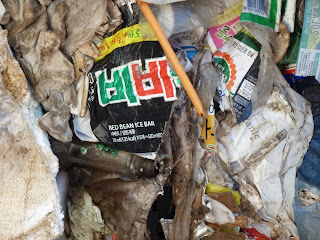Manila City Council Lauded for Thumbing Down Incinerators
Environment health leaders commended the Manila City Council for unanimously passing yesterday a resolution that effectively nipped in the bud a proposal to burn Metro Manila’s trash.
Through a resolution sponsored by Councilor Numero Lim of Manila’s second district, councilors from various political blocs expressed "strong and vehement opposition" to the use of incinerators for garbage disposal as proposed by the Metro Manila Development Authority.
The City Council cited health, environmental and economic reasons for rejecting incinerators, adding "that these devices are notoriously expensive because of the energy required to burn garbage."
In lieu of incineration, the City Council urged the government to enforce “with vigor and political will” proven waste prevention and reduction measures such as source separation, reusing, recycling and composting.
The resolution immediately drew a chorus of approval from various citizens’ groups that see waste as a resource, which should be recycled back to nature or commerce instead of being dumped or burned and causing toxic pollution.
“We laud Councilor Lim and the City Council for weighing in on moves to lift the incineration ban that is enshrined in two major environmental laws. They are right in telling the concerned authorities to focus on real solutions, not on deceptive techno-fixes, that will address the garbage woes of Manila and the bulging metropolis,” said Froilan Grate, President of Mother Earth Foundation and NGO representative to the Metro Manila Solid Waste Management Board.
Republic Act 8749, the Clean Air Act, prohibits the “burning of municipal, bio-medical and hazardous wastes, which process emits poisonous and toxic fumes,” while Republic Act 9003, the Ecological Solid Waste Management Act, calls for the “adoption of the best environmental practices in solid waste management excluding incineration.”
Through a resolution sponsored by Councilor Numero Lim of Manila’s second district, councilors from various political blocs expressed "strong and vehement opposition" to the use of incinerators for garbage disposal as proposed by the Metro Manila Development Authority.
The City Council cited health, environmental and economic reasons for rejecting incinerators, adding "that these devices are notoriously expensive because of the energy required to burn garbage."
In lieu of incineration, the City Council urged the government to enforce “with vigor and political will” proven waste prevention and reduction measures such as source separation, reusing, recycling and composting.
The resolution immediately drew a chorus of approval from various citizens’ groups that see waste as a resource, which should be recycled back to nature or commerce instead of being dumped or burned and causing toxic pollution.
“We laud Councilor Lim and the City Council for weighing in on moves to lift the incineration ban that is enshrined in two major environmental laws. They are right in telling the concerned authorities to focus on real solutions, not on deceptive techno-fixes, that will address the garbage woes of Manila and the bulging metropolis,” said Froilan Grate, President of Mother Earth Foundation and NGO representative to the Metro Manila Solid Waste Management Board.
Republic Act 8749, the Clean Air Act, prohibits the “burning of municipal, bio-medical and hazardous wastes, which process emits poisonous and toxic fumes,” while Republic Act 9003, the Ecological Solid Waste Management Act, calls for the “adoption of the best environmental practices in solid waste management excluding incineration.”
For his part, Roy Alvarez, President of the EcoWaste Coalition, encouraged other local government units (LGUs) to take their cue from the Manila City Council and stop the resurgence of waste incinerators all over the country.
“LGUs should not fall prey to incinerator prophets and their misleading promises of supplying emissions-free and cost-effective waste burners. Take notice of what the Manila councilors did, don’t play with fire and pursue inclusive, climate-friendly Zero Waste systems,” stated Alvarez.
Von Hernandez, President of the Global Alliance for Incinerator Alternatives (GAIA-Philippines), also cautioned LGUs against the “formidable air pollution challenge” resulting from the discharge of persistent environmental pollutants linked with incinerators, including cancer-causing dioxins and furans.
“Modern incinerators may be equipped with advanced pollution control systems, but in the end, they only serve to capture and transfer the problem between different environmental media,” Hernandez explained.
“Ash generated by the combustion process, considered hazardous waste, typically end up being dumped in landfills. So while there are indeed modern incinerators, there is no such thing as a pollution or emissions-free incinerator,” he emphasized.
To drum up support for real solutions to garbage woes, various environmental health groups are conducting public outreach programs that will culminate with an anti-incineration parade on September 28 in Quezon City
To drum up support for real solutions to garbage woes, various environmental health groups are conducting public outreach programs that will culminate with an anti-incineration parade on September 28 in Quezon City
-end-




Comments